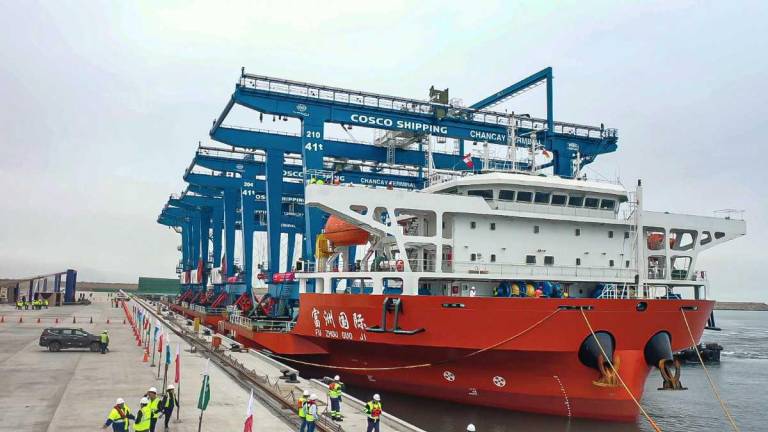
Chinathe world’s largest exporter, transports 95% of its goods by water, and since it presented its maritime infrastructure investment plan more than a decade ago, it has doubled its presence in ports around the worldalready exceeding one hundred projects on a global scale.
While in recent years the pace of investment has slowed as national economic growth has also slowed, China had a presence in 101 ports (92 of them active projects) on all continents in September 2023, according to data from the American think tank Council on Foreign Relations (CFR).
In 13 of them, Chinese participation was 50% or more, such as in the terminal of CSP Spain – a subsidiary of the state giant Cosco – in the port of Valencia. It also has a significant presence in Piraeus (Greece), Newcastle (Australia, the largest coal terminal in the world) or Hambantota (Sri Lanka).
The case of this Sri Lankan port is precisely one of the examples cited by those who criticize the strategy of Chinese investmentas it was leased to the Asian giant when the island country was unable to meet loan agreements with the Export-Import Bank of Chinabecoming one of the visible faces of the accusations of ‘debt trap’ against Beijing.
Ports have also provided political influence to China in Africaand have generated internal controversy in countries such as Germany, where Cosco acquired 24.99% of one of the terminals in Hamburg a year ago, an operation supported by the Social Democrat Chancellor, Olaf Scholz, against the ministers belonging to the Greens and Liberals, his coalition partners.
Growing presence in Latin America
In 2023, trade between China and Latin America China’s exports to Peru have broken its record by exceeding US$ 480 billion. And China’s interest in the region is not limited only to the purchase and sale of goods, as shown by its presence in ports in the region, where two in particular stand out: Chancay (Peru) and Paranaguá (Brazil).
The Peruvian terminal It brings together an investment of US$ 3.5 billion managed by Cosco, and it is expected that, after entering into operation in the middle of this year, it will become an important logistics center not only for the Peruvian mineral exports but for all of South America.
In 2018, the China Merchants Port group acquired 90% of the Paranaguá management company for around 925 million dollars, reducing its stake to 67.5% two years later after selling that part to two Chinese cooperation funds.
Strategic investments in the region also place Chinese influence in Mexico (ports of Veracruz or Tuxpan), Panama (Balboa), Ecuador (Posorja) or Chile (San Antonio).
A notable case is that of Argentina, where China Shaanxi Chemical Industry Group signed an agreement to build a multipurpose port in Río Grande (Tierra del Fuego), which has raised interest due to its possible military implications given its strategic location facing the Antarctic region.
Military use?
And Chinese investments in ports have generated concern in USA In the context of growing geopolitical tensions between Washington and Beijing, the US media is pointing to possible uses that go beyond the commercial for these infrastructures: logistical support, intelligence gathering or even as future military bases.
According to CFR, a dozen of the projects with majority Chinese participation would have a “physical potential” for use by warships. Until now, Beijing It only has one naval support base abroad, opened in 2017 in the small nation of Djibouti, in the Horn of Africa.
The Chinese official press claims that these allegations are “unfounded speculations” and argues that the country’s rapid growth in investments in ports abroad are “a natural result of growing trade with international markets”.
In a lengthy article published in August last year, the state news agency Xinhua argued that these ports “They have generated considerable revenue for local governments, boosted economic development and infrastructure construction, and increased employment.”.
In response to the diary The Wall Street Journalwhich claimed that Chinese military vessels had made diplomatic or refueling stops in a third of the ports where Chinese firms had investments, an academic quoted by Xinhua said that “There is nothing wrong with China investing in foreign ports for non-war operations in peacetime”.
Source: Gestion
Ricardo is a renowned author and journalist, known for his exceptional writing on top-news stories. He currently works as a writer at the 247 News Agency, where he is known for his ability to deliver breaking news and insightful analysis on the most pressing issues of the day.












